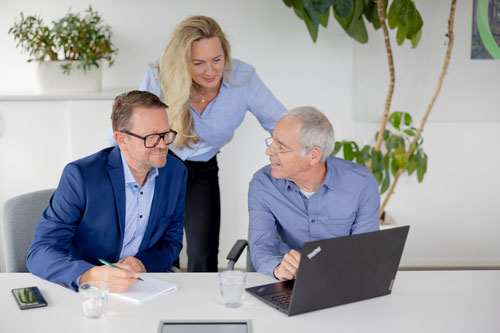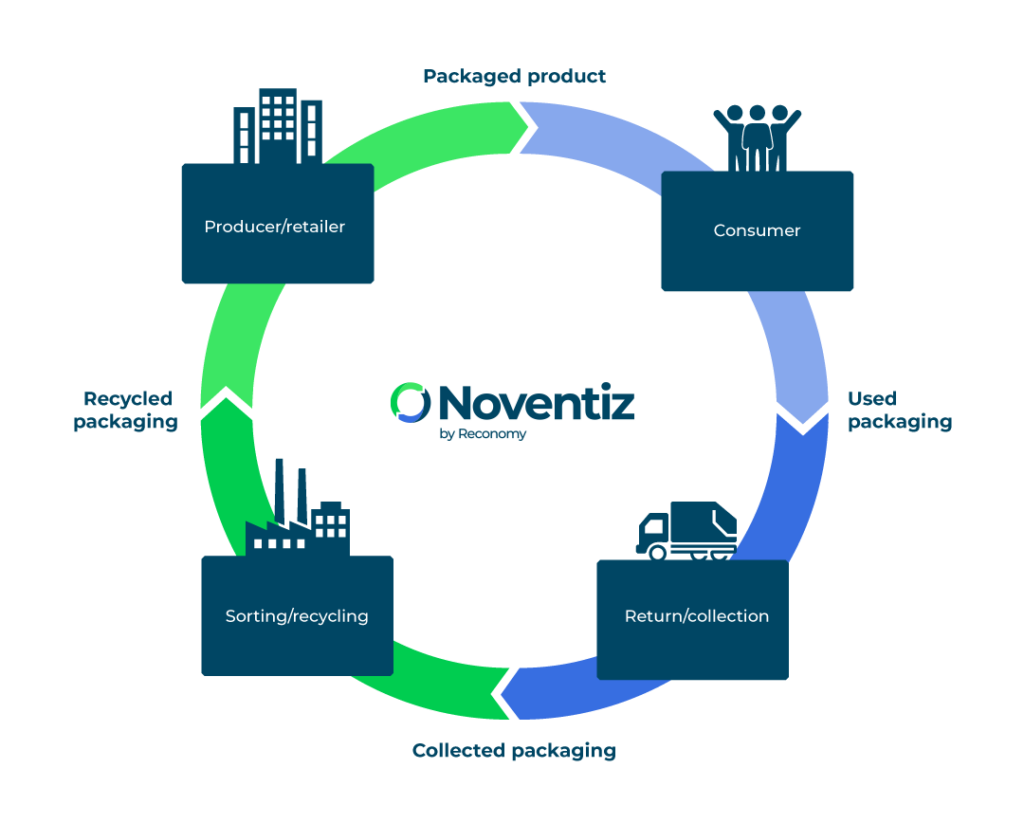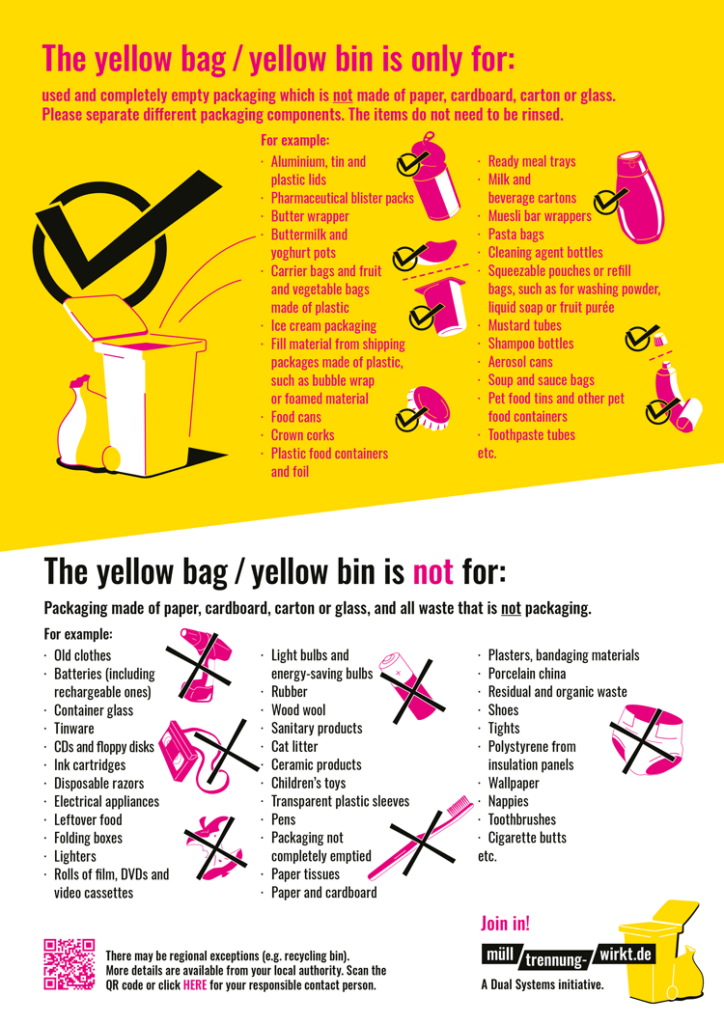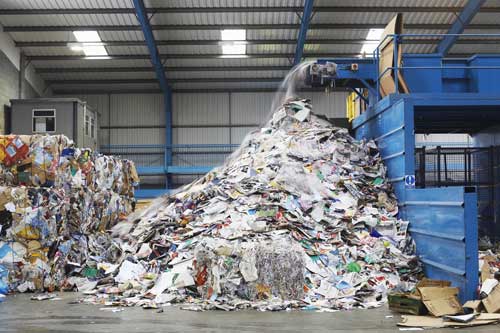Dual system: Noventiz Dual
Since 2017, Noventiz has been a certified operator of its own dual system, Noventiz Dual. The law requires producers, distributors, mail-order companies and online retailers to collect, sort and recycle the packaging they have placed on the market. This is a complex task which they cannot accomplish on their own. And that’s where dual systems such as Noventiz Dual come in.
Noventiz Dual – an experienced system operator
Noventiz has been supporting clients in all matters relating to licensing since 2007, and since 2017, Noventiz has been operating and providing its own dual system. Noventiz Dual ensures that the sales packaging that regularly accumulates in Germany’s 40 million households is collected and recycled. We help businesses of all shapes and sizes – from small businesses to large corporations.
What we offer
- 15+ years of market experience: get personal advice on your legal obligations from specialised experts.
- Online packaging licensing in just 3 easy steps with Packaging Direct.
- One-stop shop: comprehensive product portfolio covering a wide range of services for Extended Producer Responsibility (also within the EU).
- A strong partner at your side: as part of Reconomy, we have access to an international network of experts.
- More than just compliant: consultancy about environmental regulations and potentials. For more sustainability and efficiency.

Certified according to ISO 9001
ISO 9001 is recognised worldwide as a hallmark of quality. In 2017, Noventiz took the decision to have the company’s processes and their effectiveness assessed by independent auditors with industry experience. The accredited auditing company ESC Cert GmbH certifies that Noventiz’s services in the area of national take-back and recovery of sales packaging and other used products comply with international standards, as do the other operational waste management services.
Dual system: signing a licence agreement
Many businesses are wondering how to meet their obligations under the German Packaging Act and how to conclude a licence agreement with a dual system.
With Noventiz, this is a piece of cake – and requires just 3 steps:
- Enter the packaging volumes you expect to put on the market using our easy-to-use Packaging Direct online shop. The licence fee is calculated on the basis of the data you provide.
- In a second step, you need to submit information about your company.
- You conclude the licence agreement in the third step by making your payment. You are now registered in Noventiz’s dual system.

Do you have questions about the registration process with Noventiz Dual?
Ask away! Write us a message or give us a call. We are happy to help!
Dual system – what’s that all about?
Germany has a sophisticated waste management, collection and reporting system. One element is the so-called dual system, a network organised by the private sector that exists alongside the publicly organised waste management system. It is specifically responsible for packaging.
The dual system in Germany
On behalf of retail and industry
Industry and commerce commission dual systems with collecting, sorting and recycling used sales packaging made of plastic, aluminium, glass or paper. The initial distributors of the packaged products are required to pay for this under the Extended Producer Responsibility (EPR). Whoever first puts a product on the market for profit should also be responsible for the disposal and recovery of the packaging. This is to ensure that the maximum amount of packaging is recycled, reducing waste.

Consumers play a key role
Within the system, private consumers also play an important role: When disposing of their used packaging, they sort it according to the type of packaging, e.g. into the yellow bin, the paper bin or the bottle bank. Separation is the prerequisite for recycling to work. The bins and banks are emptied regularly and the packaging is taken to sorting and recycling facilities, where it is sorted into different waste types and recycled as effectively as possible.
The disposal of non-recyclable waste from private households, on the other hand, is organised by public bodies. The cost is borne by the final consumer, who pays a fee to the city or municipality. Non-recyclable waste, as the name suggests, is not suitable for recycling. This is why most of it is incinerated to produce thermal energy. Only a small proportion is sent to separating plants.
“Mülltrennung wirkt” information campaign
Noventiz Dual supports the information campaign “Mülltrennung wirkt” (sorting waste works) organised by the dual systems. In addition to reducing the amount of non-recyclable waste in yellow bins/bags and improving the quality of the collected mixture of waste, this information campaign wants to increase the volume of packaging collected in yellow bags/bins. Too much packaging continues to end up with the non-recyclable waste, leaving the recycling loop.
The information campaign aims to dispel existing prejudices, explain the reasoning behind the separate waste collection and motivate final consumers to take sorting more seriously. Citizens need to recognise their key role in effective packaging recycling. Reusable materials can only be kept in the cycle, saving resources and CO2, if the population collects and properly separates packaging from non-recyclable waste.


Recycling and disposal: How does the dual system work?
Industry and commerce measure and report the volume of sales packaging they place on the market. They pay participation fees, also known as licence fees, to a dual system of their choice for the collection, sorting and recovery. The cost of the licence fee depends on the type of material and the mass of the packaging placed on the market. In Germany, the dual systems base their work on the current Packaging Act.
Would you like to participate in a dual system by licensing your packaging? We are happy to help!
Further information Producer obligations under the German Packaging Act
Good to know: In addition to registering with a dual system, the German Packaging Act also requires producers to register with the LUCID Packaging Register. Visit the following pages for more information.